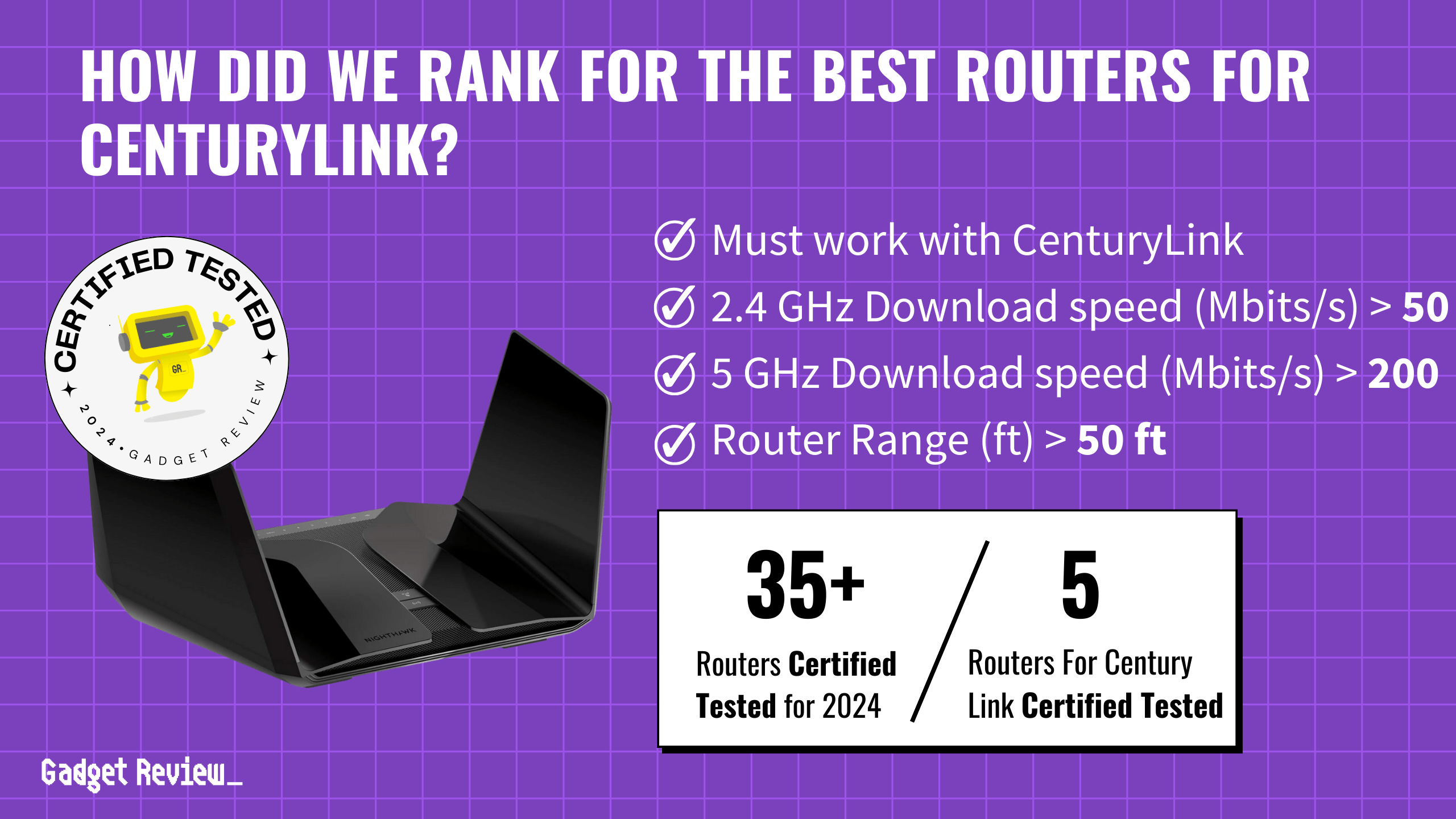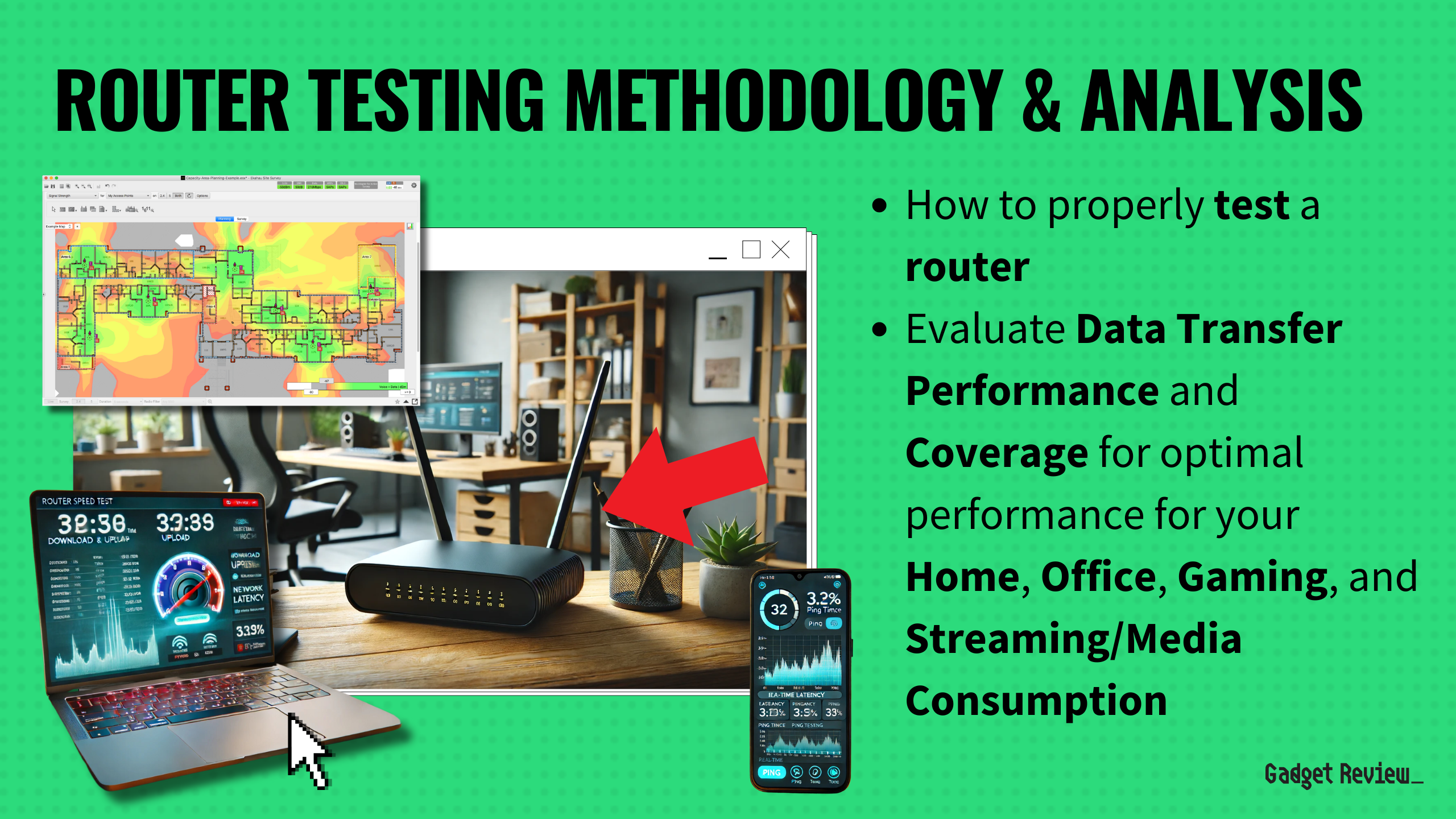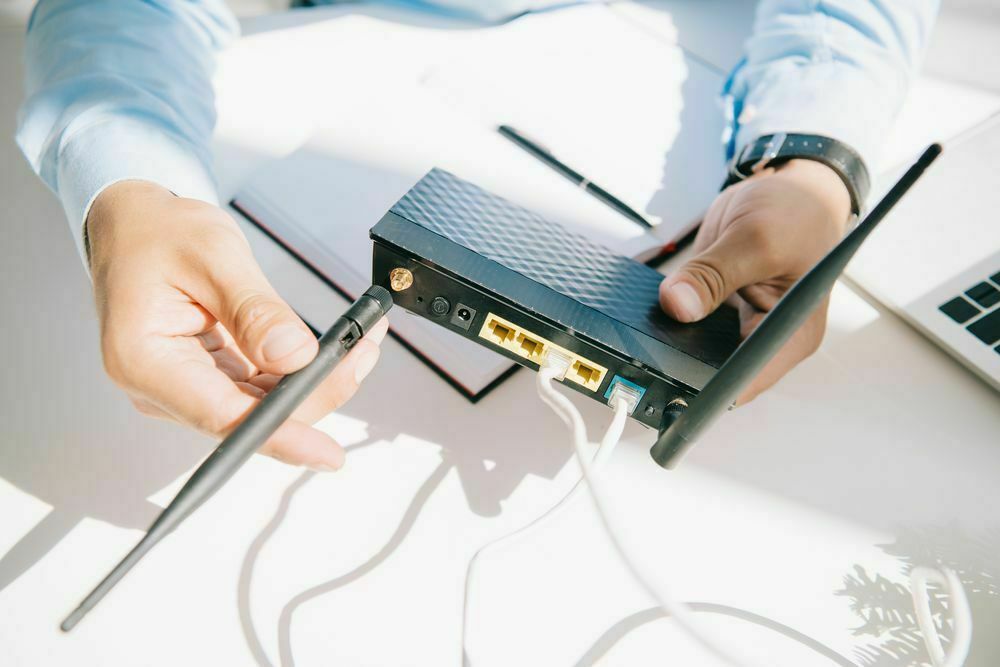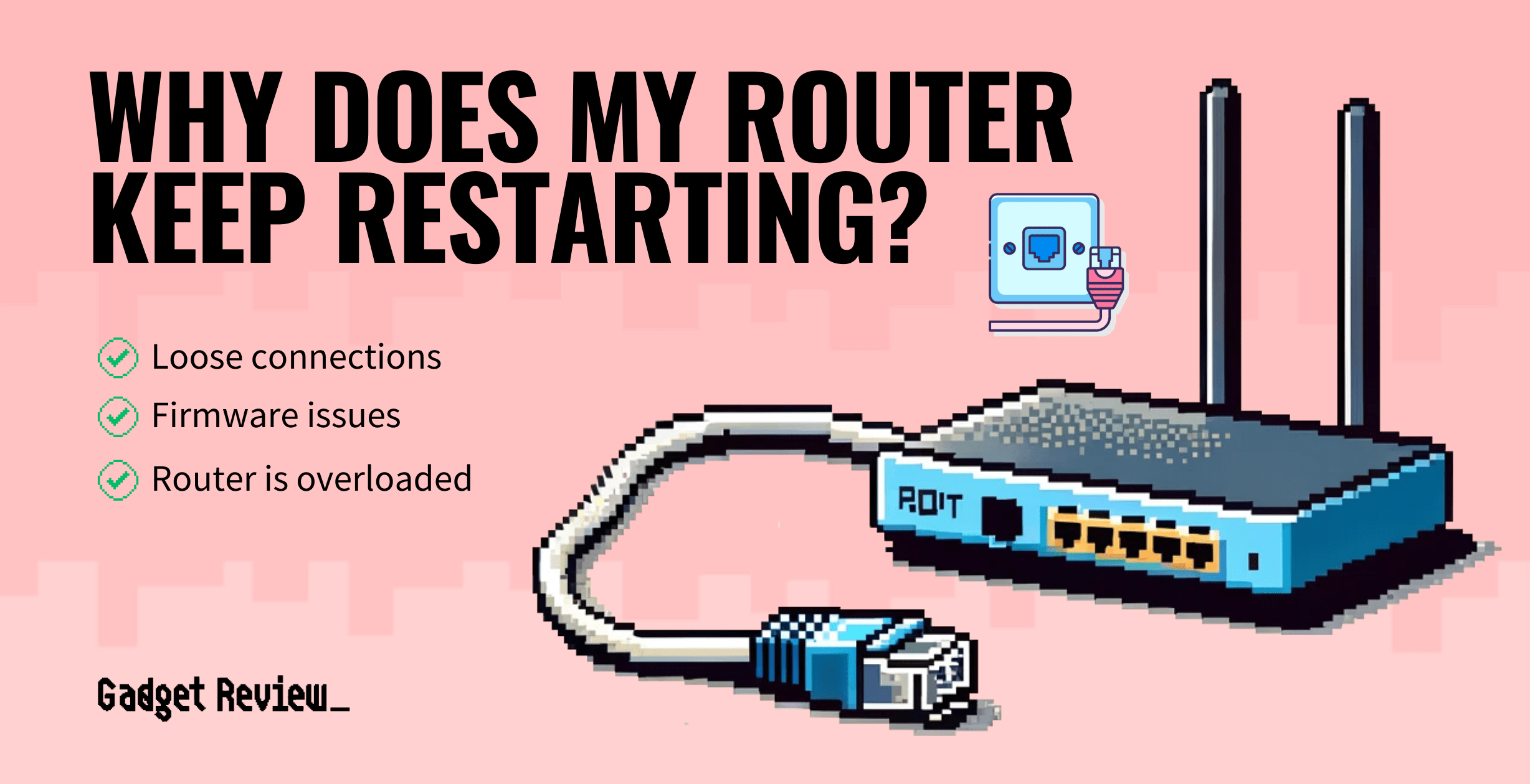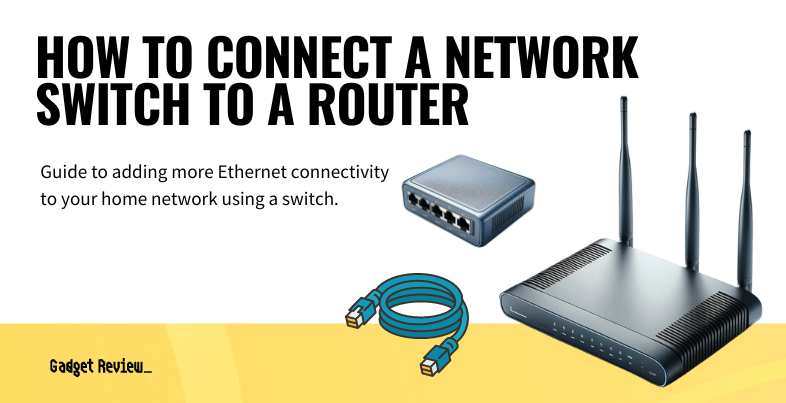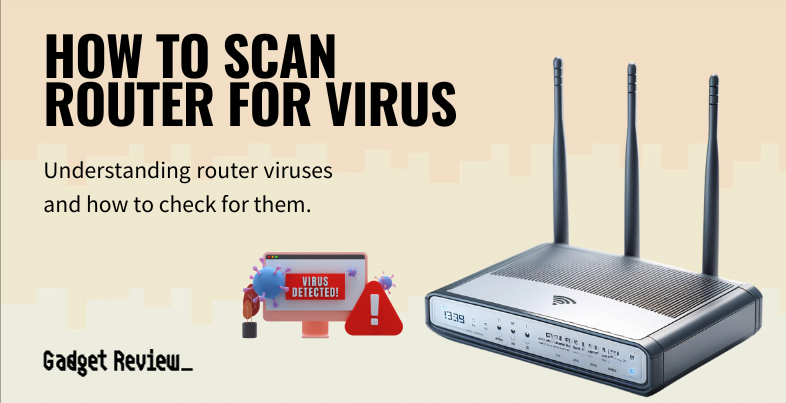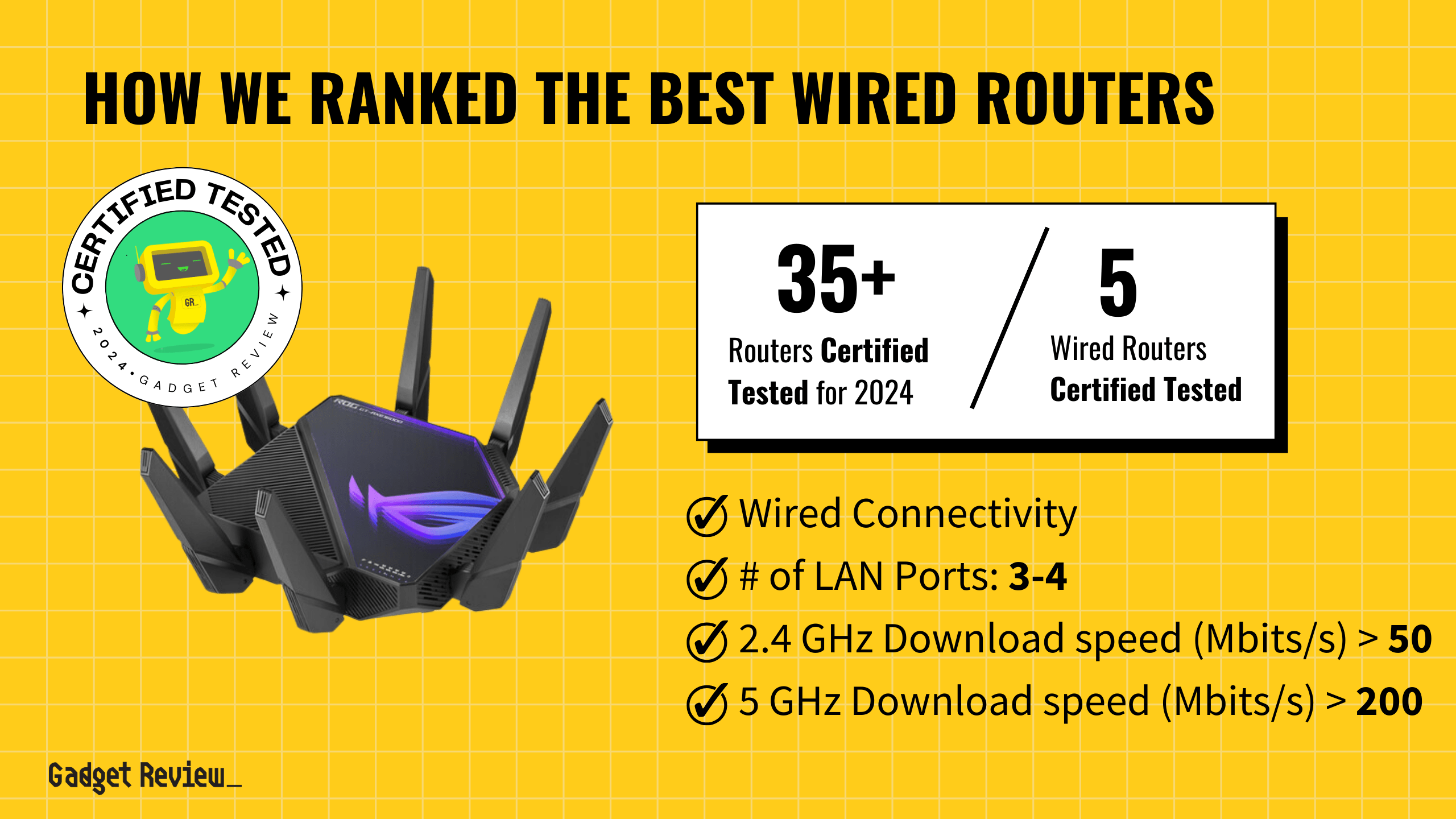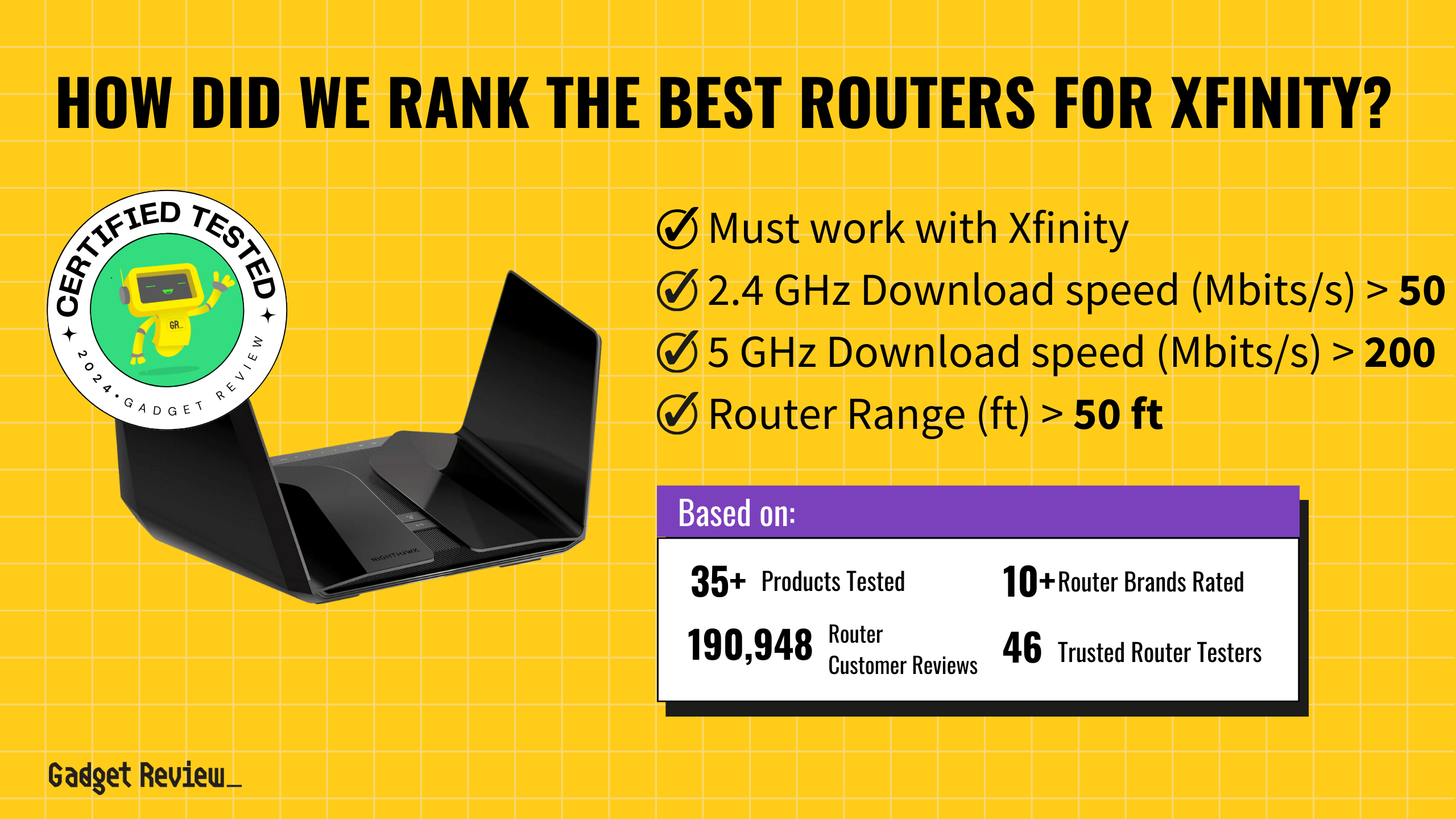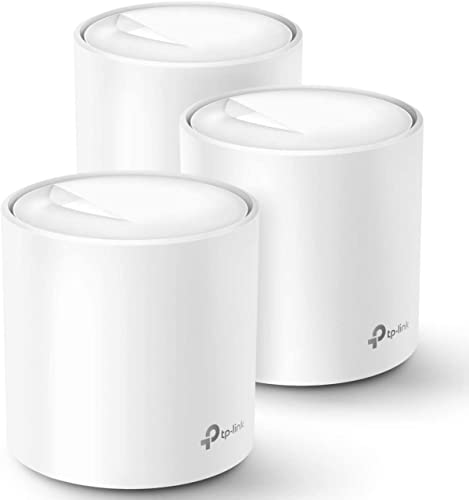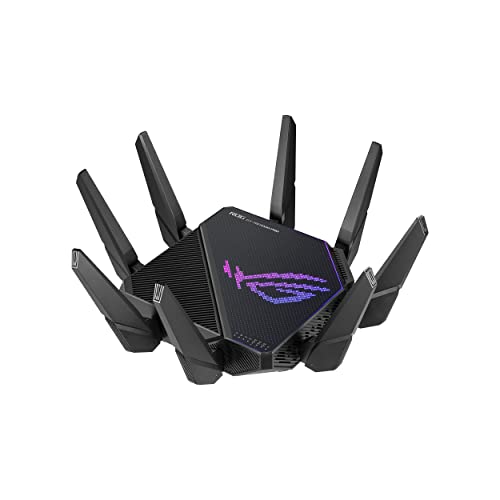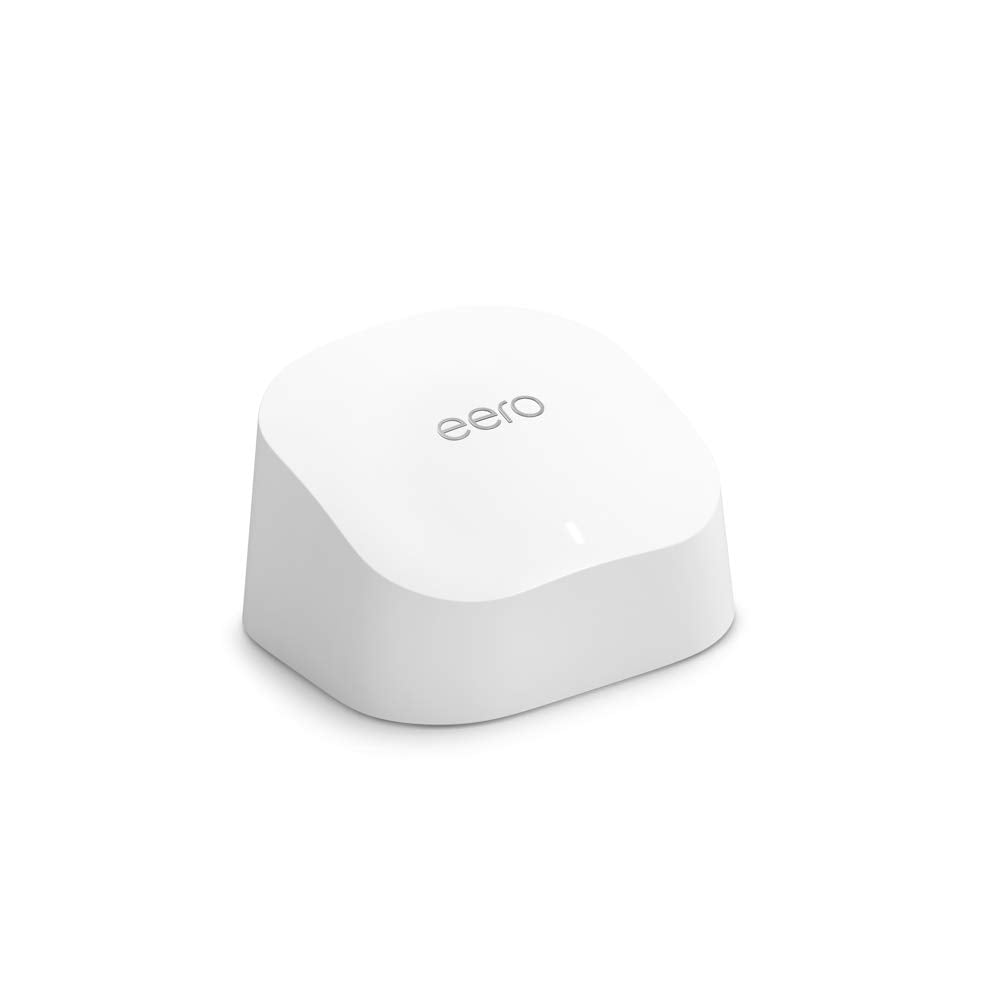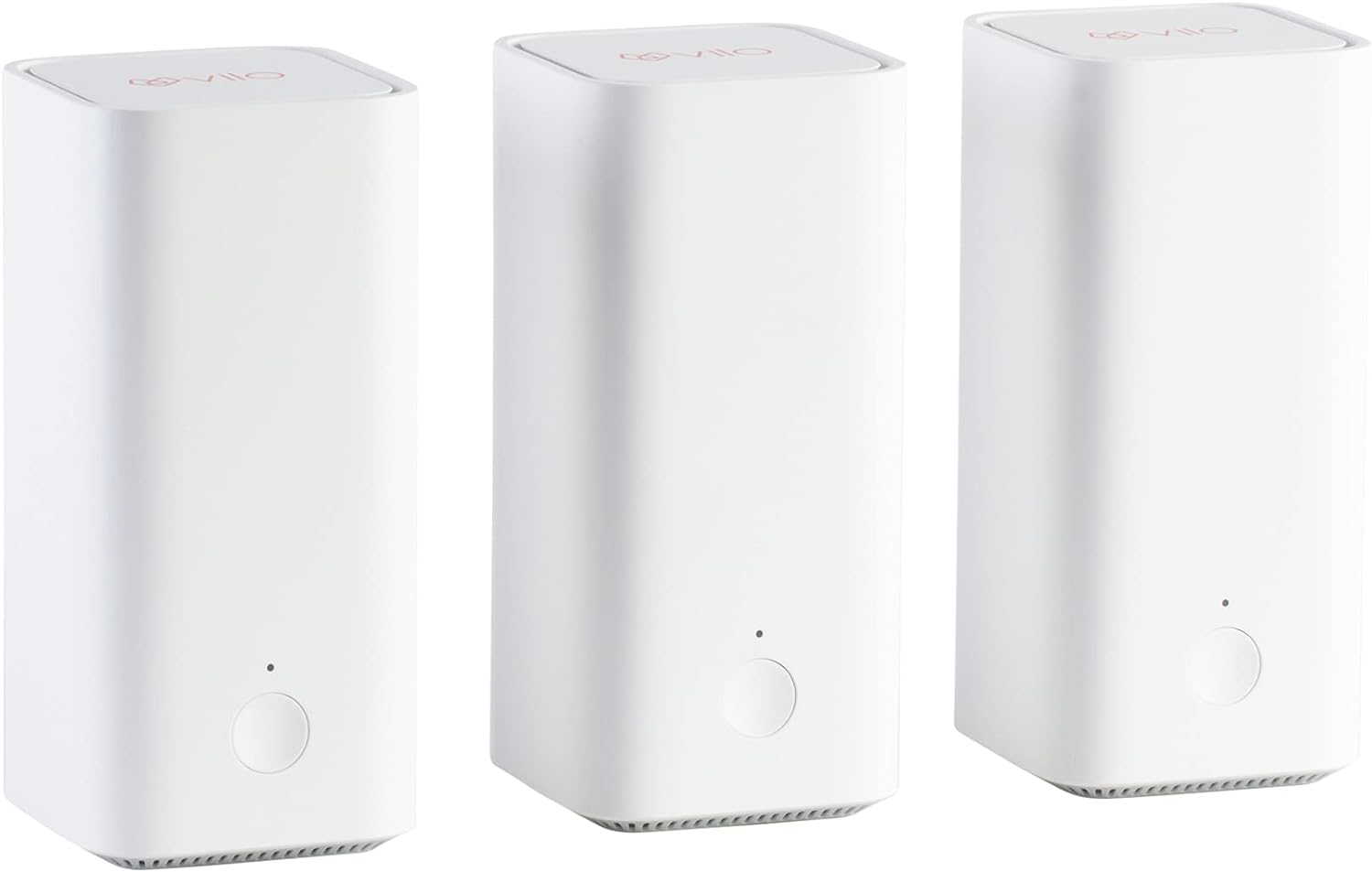When selecting a great router for CenturyLink, consider models that offer excellent compatibility and performance with their DSL or fiber optic services. Prioritize routers with robust 2.4GHz and 5GHz bands, ensuring at least 50 Mbps and 200 Mbps download speeds, respectively. We evaluated 37 routers and certified 5 as top choices for CenturyLink, analyzing 193,457 reviews.
Our process filters out fake and low-quality reviews using our proprietary scientific True Score system and certifies products as tested. The winning routers excelled in performance, offering reliable connectivity, ease of use, and advanced features. They are ideal for a range of activities, ensuring a stable connection and efficient data transmission across your home or office.
How Did We Rank the Best Routers for CenturyLink?
To identify the best routers for CenturyLink, we evaluated over 200 websites, focusing on testing methods and customer reviews. We considered expert insights and critical user feedback, leading us to pinpoint 2 necessary test results, 2 advantageous test results, and 1 essential specification. Our true score system ensures our buying guide is the most accurate and reliable, providing you with the best router options for CenturyLink.
Our commitment to unbiased reviews is powered by our ‘True Score’ system, targeting low quality and fake reviews. When you shop through our links, you’re backing our mission. Dive deeper to see how.
Minimum Specifications
- Must work with CenturyLink
Test Criteria
- 2.4 GHz Download Speed: A download speed on the 2.4 GHz band of at least 50 Mbits.
- 5 GHz Download Speed: A download speed on the 5 GHz band of at least 200 Mbits.
? “Nice To Haves”
- Router Range: A range of at least 50 feet before the signal from the router begins to become noticeably weaker.
- Latency: A latency of 30 ms or less.
Latest Updates
- 06/19/2024: Republished the list to include the best routers for CenturyLink based on our True Score system.
Top Routers for CenturyLink For 2026
Prices accurate at the time of publishing

Best Overall

Runner Up

Best Value

Best Budget

Best Mid-Range

Premium Pick
Netgear Nighthawk RAXE300
Best For Centurylink
For CenturyLink users with large spaces and high-bandwidth needs like gaming and streaming, the Netgear Nighthawk RAXE300 is top-tier for a seamless connection.
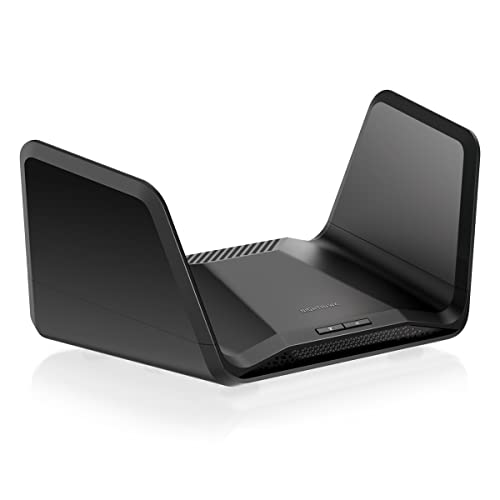
True Score
83829Experts
903kCustomers
Absolutely Fresh
 SAVE $243$399.00$155.60
SAVE $243$399.00$155.60Read More
Snapshot
Reasons to Buy
- Superb Wi-Fi speeds
- Wide range
- Simple setup
Reasons to Avoid
- Limited range (6GHz)
- No USB A port
- Subscription-based security solutions
Specifications

# of LAN Ports 6 
Frequency Bands 2.4 GHz, 5.0 GHz, 6.0 GHz 
MU-MIMO Support Yes 
Wireless Standard AC, AX, N 
Mesh System No 
Quality of Service Prioritization No 
# of Phone Ports 1 
# of WAN Ports 1 
App Compatible Yes 
Available Storage 256MB 
Band Technology Tri 
Data Encryption Type WPA-PSK, WPA2-PSK, WPA3 
Energy Star Certified No 
Integrated Modem No 
LAN Port Speed 4 Gb Ethernet 
Number of Antennas 6 
Parental Controls Yes 
Processor Cores Quad 
Processor Speed 1.7GHz 
WiFi Range 2500 sq.ft 
WiFi Speed 7.8 Gb 
Wired Speed 1000 Mb All Specs
Test Results
2.4 GHz Download speed (Mbits/s) 222 5 GHz Download speed (Mbits/s) 852 6 Ghz Download speed (Mbits/s) 757 Latency (ms) 5 Router Range (ft) 170 2.4 GHz Upload speed (Mbits/s) 0 5 GHz Upload speed (Mbits/s) 175 6 Ghz Upload speed (Mbits/s) 247 All Tests
All Retailers
- $155.60$399Save $243
- $164.99$300Save $135
- $299.99
Our Verdict
If your CenturyLink internet needs to support a large area and high-bandwidth activities, the Netgear Nighthawk RAXE300 is an exceptional choice, especially if you have tech-heavy hobbies like gaming and streaming. With 2.4 GHz download speeds hitting a best-in-class 221.65 Mbits/s, 851.6 Mbits/s at 5 GHz, and 756.8 Mbits/s at 6 GHz, this router guarantees a smooth and efficient connection for your gaming, 4K streaming, or VR activities. Its uploading ability is equally impressive, with speeds of 175 Mbits/s on the 5 GHz and 247.2 Mbits/s on the 6 GHz band, ensuring rapid data transfers for clean video calls, competitive online gaming, and swift cloud storage syncing.
For users demanding consistent, lag-free gaming or streaming sessions, note that this router has a best-in-class latency of just 5 ms and covers an expansive range of up to 170 ft, maintaining an uninterrupted connection throughout your living or working space. If you compare the Nighthawk to the Eero Max 7, both have excellent latency and 6 GHz capabilities. The Eero Max 7 offers higher speeds for handling 4K content, yet the RAXE300’s significantly wider range makes it the better option for large homes and offices.
If you’re an avid gamer, streamer, or professional in a large home or small business, the Nighthawk RAXE300 excels with its comprehensive download and upload speeds, minimal latency, and extensive reach. Although it has a high cost and it’s not the fastest in every GHz band, its overall performance and reliability make it a premier, all-encompassing router solution that justifies the investment.
Read Less

Best Overall

Runner Up

Best Value

Best Budget

Best Mid-Range

Premium Pick
Asus RT-AX86S
Best For Gaming
Ideal for CenturyLink users on a budget in large homes, the Asus RT-AX86S offers great coverage, speed, and value, perfect for gaming and streaming.
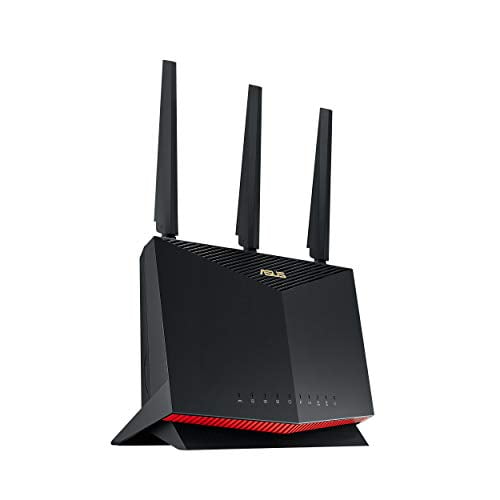
True Score
83823Experts
891kCustomers
Absolutely Fresh
 SAVE $23$225.00$202.24
SAVE $23$225.00$202.24Read More
Snapshot
Reasons to Buy
- Fast WiFi and download speeds
- Incredible range of coverage
- Easy installation and set up
- Low Latency
Reasons to Avoid
- Lacks Backhaul and Mesh Networking
Specifications

# of LAN Ports 4 
Frequency Bands 2.4 GHz, 5.0 GHz 
MU-MIMO Support Yes 
Wireless Standard AC, AX, N 
Mesh System No 
Quality of Service Prioritization Yes 
# of Phone Ports n/a 
# of WAN Ports 1 
App Compatible Yes 
Available Storage 256MB 
Band Technology Dual 
Data Encryption Type WPA, WPA-Enterprise, WPA2, WPA2-Enterprise, WPA3, WPA3-Enterprise, WPS 
Energy Star Certified No 
Integrated Modem No 
LAN Port Speed 4 Gb Ethernet 
Number of Antennas 4 
Parental Controls Yes 
Processor Cores Dual 
Processor Speed 1.8GHz 
WiFi Range 5400 sq. ft 
WiFi Speed 5.7 Gb 
Wired Speed – All Specs
Test Results
2.4 GHz Download speed (Mbits/s) 89 5 GHz Download speed (Mbits/s) 563 6 Ghz Download speed (Mbits/s) 0 Latency (ms) 15 Router Range (ft) 140 2.4 GHz Upload speed (Mbits/s) 0 5 GHz Upload speed (Mbits/s) 23 6 Ghz Upload speed (Mbits/s) 0 All Tests
All Retailers
- $202.24$225Save $23
Our Verdict
If you’re seeking a cost-effective router for your CenturyLink internet that can manage the demands of a large home or office, the Asus RT-AX86S is an exceptional choice. Tailored for medium to large areas, it provides coverage up to 140 ft and a 15 ms latency, ensuring expansive and swift network performance ideal for applications sensitive to lag, such as online gaming and video conferencing.
This router has great 5 GHz download capabilities reaching up to 563 Mbits/s and upload speeds of 23 Mbits/s, well-suited for handling high-demand tasks. While it may not feature a 6 GHz band, its performance on the 5 GHz band accommodates streaming and gaming, offering significant value at its price point. Additionally, its 2.4 GHz band supports upload speeds of 89.00 Mbits/s, facilitating a variety of online activities.
Compared to the Netgear Nighthawk RAXE300, both can provide stable coverage to large homes or offices. The RAXE300’s range is a bit higher, though, so it’s ideal for larger spaces with its broad range and is more responsive with lower latency, but the RT-AX86S holds its ground by offering great speeds at a lower cost than the RAXE300.
CenturyLink subscribers looking for an affordable yet reliable router solution for expansive spaces should consider the Asus RT-AX86S. With its notable 5 GHz speed and large Wi-Fi coverage, it is an excellent investment. Despite its more modest 2.4 GHz performance and higher latency, it supports gaming, streaming, and smart home connectivity, making it a budget-friendly choice for a large home or small business.
Read Less
Did you know 64% of router reviewers are untrustworthy?
Our research found only 46 of 127 router reviewers as of February 2026 can be trusted. This is why Gadget Review is committed to calculating the most accurate product scores on the web.
To do this, we give every router review site a Trust Rating, which measures how trustworthy the site and their testing claims are. We then leverage AI & a machine learning model to combine and calculate the Trust Rating with data from experts and consumers to deliver the True Score, the web’s most accurate product quality rating.
 193,457
193,457Router Reviews Analyzed

37
Total Products Analyzed

Best Overall

Runner Up

Best Value

Best Budget

Best Mid-Range

Premium Pick
Asus ROG GT6 Mesh
Best For Small Business
Ideal for CenturyLink users needing fast uploads for content creation or gaming, the Asus ROG GT6 Mesh offers top-tier speed and coverage.

True Score
82826Experts
864kCustomers
Absolutely Fresh
 SAVE $70$349.99$279.99
SAVE $70$349.99$279.99Read More
Snapshot
Reasons to Buy
- Fast Download/Upload Speed
- Easy to install and operate
Reasons to Avoid
- WiFi speed drops off at long range
- Connection range is limited
- Limited USB Connectivity
- Mediocre Latency
Specifications

# of LAN Ports 3 
Frequency Bands 2.4 GHz, 5.0 GHz 
MU-MIMO Support Yes 
Wireless Standard AC, AX, N 
Mesh System Yes 
Quality of Service Prioritization Yes 
# of Phone Ports n/a 
# of WAN Ports 1 
App Compatible Yes 
Available Storage 256MB 
Band Technology Tri 
Data Encryption Type WEP, WPA-Enterprise, WPA-PSK, WPA2-Enterprise, WPA3-Personal 
Energy Star Certified No 
Integrated Modem No 
LAN Port Speed 3 Gb Ethernet 
Number of Antennas 9 
Parental Controls Yes 
Processor Cores Triple 
Processor Speed 1.7GHz 
WiFi Range 5800 sq. ft 
WiFi Speed 2.6 Gb 
Wired Speed 2500 Mb All Specs
Test Results
2.4 GHz Download speed (Mbits/s) 139 5 GHz Download speed (Mbits/s) 701 6 Ghz Download speed (Mbits/s) 0 Latency (ms) 22 Router Range (ft) 95 2.4 GHz Upload speed (Mbits/s) 112 5 GHz Upload speed (Mbits/s) 619 6 Ghz Upload speed (Mbits/s) 0 All Tests
All Retailers
- $279.99$350Save $70
- $331.99$350Save $18
Our Verdict
If you’re a content creator or professional using CenturyLink internet and looking for a router that ensures a seamless online experience, the Asus ROG GT6 Mesh stands out with its best-in-class upload speeds. Featuring tri-band technology, it’s ideal for demanding tasks like 4K streaming and online gaming, with upload speeds of 618.5 Mbits/s on the 5 GHz band and 111.9 Mbits/s on the 2.4 GHz band, catering to quick file uploads for cloud storage and video creation. Its download capabilities are also great, with speeds reaching 701.3 Mbits/s on the 5 GHz band and 139.35 Mbits/s on the 2.4 GHz band, ensuring consistent connectivity for daily internet use and smart home devices.
If you live or work in a medium-sized area, the router’s 95 ft range provides ample Wi-Fi coverage, eliminating lag and buffering. With a latency of 22 ms, it delivers a responsive experience sufficient for most online activities. Compared to the Asus RT-AX86S, which offers a longer range and lower price, the ROG GT6 has better mesh networking capabilities and faster speeds, making it a prime choice if you need speedy performance for intensive online activities.
The ROG GT6 Mesh excels with its powerful upload speeds and effective coverage for medium-sized homes and offices. Although it comes at a premium price and features slightly higher latency, it’s still a worthwhile investment if you’re a competitive gamer, content creator, or professional needing reliable, high-speed internet access across larger living or workspaces.
Read Less

DON’T SEE WHAT YOU’RE LOOKING FOR?
When choosing a great router for Spectrum Internet, consider models that offer high-speed performance and reliable coverage. A Netgear router is often recommended for its robust features and ease of use. For those who need voice-over-IP services, selecting an excellent router for VoIP ensures clear and uninterrupted communication.
Finding a top router for Optimum can enhance your internet experience by providing fast and stable connections. If you’re curious about how to use a router without a modem, it’s essential to know that a router alone can create a local network, but you’ll need a modem to connect to the internet.

Best Overall

Runner Up

Best Value

Best Budget

Best Mid-Range

Premium Pick
Eero Max 7
Best For Mesh
For CenturyLink users seeking top speed and cutting-edge band technology, the Eero Max 7 excels with premier 6 GHz capabilities for seamless online activities.
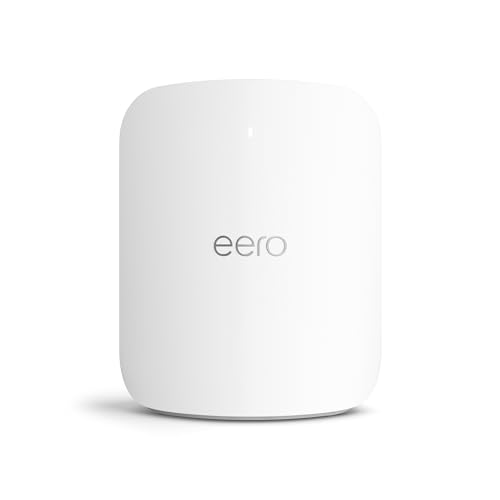
True Score
81807Experts
871kCustomers
Absolutely Fresh
 SAVE $150$599.99$449.99
SAVE $150$599.99$449.99Read More
Snapshot
Reasons to Buy
- Exceptional Download WiFi Speed
- Easy Installation and Configuration
- Low Latency
Reasons to Avoid
- Poor 2.4 GHz Upload Speeds
- Short Range of Coverage
- Limited Port Space
Specifications

# of LAN Ports 4 
Frequency Bands 2.4 GHz, 5.0 GHz, 6.0 GHz 
MU-MIMO Support Yes 
Wireless Standard BE 
Mesh System Yes 
Quality of Service Prioritization No 
# of Phone Ports n/a 
# of WAN Ports 1 
App Compatible Yes 
Available Storage 4000MB 
Band Technology Tri 
Data Encryption Type WPA2-Personal, WPA3-Personal 
Energy Star Certified No 
Integrated Modem No 
LAN Port Speed 2 Gb Ethernet 
Number of Antennas 10 
Parental Controls Yes 
Processor Cores Quad 
Processor Speed – 
WiFi Range 2500 sq.ft 
WiFi Speed 4.3 Gb 
Wired Speed 10000 Mb All Specs
Test Results
2.4 GHz Download speed (Mbits/s) 96 5 GHz Download speed (Mbits/s) 1,078 6 Ghz Download speed (Mbits/s) 1,223 Latency (ms) 7 Router Range (ft) 90 2.4 GHz Upload speed (Mbits/s) 75 5 GHz Upload speed (Mbits/s) 411 6 Ghz Upload speed (Mbits/s) 638 All Tests
All Retailers
- $449.99$600Save $150
- $449.99$600Save $150
Our Verdict
If you have CenturyLink internet and want the fastest router featuring the latest band technology, the Eero Max 7 is an outstanding choice due to its best-in-class 6 GHz band capabilities. It brings to the table download and upload speeds of 1222.5 Mbits/s and 638 Mbits/s, respectively, accommodating high-resolution streaming, online gaming, and connecting multiple smart home devices with ease. Using tri-band technology, it excels in the 6 GHz domain and impresses with 5 GHz performance, offering a superior 1078.5 Mbits/s download and 410.6 Mbits/s upload speeds for seamless connectivity across diverse applications. The 2.4 GHz band provides reliable speeds of 95.9 Mbits/s download and 74.8 Mbits/s upload, ensuring stable internet for daily activities.
With a minimal latency of just 7 ms, the Eero Max 7 delivers rapid response times essential for uninterrupted gaming and video calls. Its range extends to 90 ft, suitable for small to medium-sized settings.
Comparing it to the Netgear Nighthawk RAXE300, both support 6 GHz capabilities and have minimal lag, but the RAXE300 is more affordable and has a higher range that suits larger spaces. The Eero Max 7 has superior 6 GHz speeds, making it the go-to choice to support streaming, VR, and smart device management.
Choosing the Eero Max 7 will give you unparalleled 6 GHz performance, which is essential if you demand the highest quality for streaming and internet usage. Though it may come at a premium and can’t support a very large home or office, its superb performance and mesh networking capabilities make it a great investment for a high-quality online experience.
Read Less
Category Snapshot
Routers
- Total Brands/Products Tested
12 Brands, 37 Products
- Top 2 Brands
Netgear, Asus
- Price Range (Budget-Premium)
$45-$600
- Average True Score
79.42
- Important Test Criteria
Download & Upload Speed (bits/second)
Range (feet/meters)
- Most Trusted Testers

- Top Router Experts
- Typical Warranty
1 year
- Covered by Insurance
Yes – AKKO

Best Overall

Runner Up

Best Value

Best Budget

Best Mid-Range

Premium Pick
TP-Link Archer AXE75
Best For Wired
Ideal for CenturyLink users on a budget living or working in small spaces, the TP-Link Archer AXE75 offers solid performance and tri-band tech.
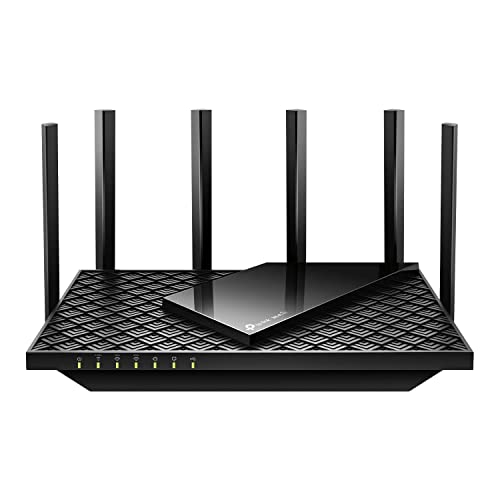
True Score
80794Experts
852kCustomers
Absolutely Fresh
 SAVE $64$179.99$115.99
SAVE $64$179.99$115.99Read More
Snapshot
Reasons to Buy
- Good WiFi speeds
- Adequate range
- Simple set up
Reasons to Avoid
- Average download speeds
- Limited coverage
- Subscription-based security solutions
Specifications

# of LAN Ports 4 
Frequency Bands 2.4 GHz, 5.0 GHz, 6.0 GHz 
MU-MIMO Support Yes 
Wireless Standard AC, AX 
Mesh System Yes 
Quality of Service Prioritization Yes 
# of Phone Ports n/a 
# of WAN Ports 1 
App Compatible Yes 
Available Storage n/a 
Band Technology Tri 
Data Encryption Type WPA3 
Energy Star Certified n/a 
Integrated Modem No 
LAN Port Speed Gigabit Ethernet 
Number of Antennas 6 
Parental Controls Yes 
Processor Cores Triple 
Processor Speed 1.7GHz 
WiFi Range 2500 sq.ft 
WiFi Speed 2.4GHz 
Wired Speed 1000 Mb All Specs
Test Results
2.4 GHz Download speed (Mbits/s) 65 5 GHz Download speed (Mbits/s) 309 6 Ghz Download speed (Mbits/s) 318 Latency (ms) 9 Router Range (ft) 60 2.4 GHz Upload speed (Mbits/s) 0 5 GHz Upload speed (Mbits/s) 0 6 Ghz Upload speed (Mbits/s) 0 All Tests
All Retailers
- $115.99$180Save $64
- $134.99$159Save $24
Our Verdict
If you’re a CenturyLink internet subscriber seeking a router that combines affordability with reliable performance, the TP-Link Archer AXE75 is ideal. It uses tri-band technology, offering a 6 GHz download speed of 317.9 Mbits/s to efficiently meet diverse online demands like HD streaming and casual gaming. It delivers uninterrupted connectivity over 2.4 GHz and 5 GHz bands. It achieves download speeds of 65.05 Mbits/s on the 2.4 GHz band and 309.1 Mbits/s on the 5 GHz band, capably handling tasks such as web browsing, email, and multimedia entertainment. Despite its limited range of 60 ft, which suits small homes, apartments, and small businesses, the router’s swift 9 ms latency ensures prompt online interactions.
When comparing the AXE75 to the Eero Max 7, both offer responsiveness with little latency and 6GHz band capabilities. The Max 7 offers faster 6GHz speeds for more efficient, powerful performance but at a higher price. The AXE75 is a more cost-effective option for advanced, tri-band mesh networking that supports everyday use like gaming and streaming.
For CenturyLink customers looking for an economical yet efficient router for compact spaces, the TP-Link Archer AXE75 is a reliable choice that won’t break the bank. While it may not boast the highest speeds or broadest range, its mesh system compatibility, solid speeds, and Wi-Fi 6 technology still make it a strong contender for a robust, flexible home network solution without a hefty investment.
Read Less
Which Criteria Matters for Testing Best Routers for CenturyLink?
By focusing on these criteria (2 required, 2 nice to have), anyone can quickly and easily compare these routers and how they’ll perform. This helps you make an informed decision and purchase a router that will meet your needs.
| CRITERIA | RANGE | REQUIRED | DEFINITION |
|---|---|---|---|
| 2.4 GHz Download Speed | > 50 Mbits/s | Yes | The maximum speed that the router can reach when downloading on the 2.4 GHz band. |
| 5 GHz Download Speed | > 200 Mbits/s | Yes | The maximum speed that the router can reach when downloading on the 5 GHz band. |
| Router Range | > 50 ft | No (Nice to have) | How far a device can be from a router before the signal starts degrading. It is worth noting that 2.4 GHz reaches further than 5 GHz. |
| Latency | < 30 ms | No (Nice to have) | The delay that is created by a signal being sent by the router and then received. |
Our Trusted Data Sources
We looked at 120+ router reviewers and found that 46 are trustworthy (60%+ Trust Rating). The three we have listed below are our most trusted for routers.
- James Morris – Kit Guru, LinkedIn
- Matt Spencer – TechGearLab, LinkedIn
- Brian Nadel – Tom’s Guide, MuckRack
Interested in a comprehensive analysis of our data sources? We’ve got you covered. Below, you’ll find a detailed list of every router review website we’ve identified, organized by their respective Trust Ratings from highest to lowest. But we didn’t stop there. We’ve meticulously reviewed each publication and verified the data by checking whether the authors have bio links to MuckRack or LinkedIn. We’re committed to not only checking the facts but ensuring their veracity.
Router Test Data & Results
Disclaimer:
Evaluating router performance is more than hardware analysis. While hardware tests are straightforward, the challenge lies in contextualizing the results within the limits of real-world usage. Routers operate under conditions that testers cannot fully standardize, including variations in Internet Service Providers (ISPs), network traffic congestion, discrepancies between advertised and actual internet speeds, and the physical layout of homes. These factors introduce a degree of unpredictability, making it hard to draw universal conclusions. As such, our router recommendations aim to provide useful general guidance, accommodating a wide range of home environments and internet setups.
1. 2.4 GHz Download Speed (Mbits/s)
2.4 GHz Download Speed
> 50 Mbits/s
Acceptable range of performance
Definition: The top speed the router reaches downloading on the 2.4 GHz band.
Units of Measurement: Mbits/s (megabits per second)
Tools to Measure: Speed-checking software
Why It’s Important:
For older devices or for connecting at a longer range, the 2.4 GHz frequency is the only one that you’ll be able to use, so it should have usable speed.
The oldest and slowest of the bands on a router is the 2.4 GHz band, but it sticks around for a reason. Generally speaking, while this band features the slowest available speeds and has the lowest bandwidth, but also reaches out the furthest. It’s not the best band to connect to connect if you need high speeds, but if you just need to be connected for light browsing or anything that’s low bandwidth, it works. Alternatively, if you own a lot of old devices, this band may be the only band they can “see” and therefore, use.
Given the age of the band, top speeds on 2.4 GHz cap out very quickly. We recommend a speed of at least 50 Mbits/s, but if you aren’t really going to be using this band for anything other than checking web pages, you can go lower. It’s worth noting, though, that this might lead to a more frustrating and laggier time on modern sites with lots of scripting and high-quality images.
2.4 GHz Download Speed (Mbits/s; higher is better; 0 = No Data)
2. 5 GHz Download Speed (Mbits/s)
The much faster 5 GHz band offers up much greater bandwidth and is much, much better at meeting high-speed demands. Streaming high-quality video, using streaming services, gaming, downloading large files and games – the 5 GHz band is what makes all of these activities quick and bearable. It reaches a lower range than the 2.4 GHz band, but it’s also much faster, so you’ll use it more, especially on newer devices that actually support the band.
Given how much you’ll be using this band, we recommend a speed of at least 200 Mbits/s to ensure you’re able to enjoy streaming and gaming on at least a few devices simultaneously. Any lower and you start to run into real bottleneck concerns, such as endless buffering, lagging, or drops in connection.
5 GHz Download Speed
> 200 Mbits/s
Acceptable range of performance
Definition: The top speed the router reaches downloading on the 5 GHz band.
Units of Measurement: Mbits/s (megabits per second)
Tools to Measure: Speed-checking software
Why It’s Important:
This band is used by most modern devices and offers greater speeds that enable activities like gaming and HD streaming on multiple devices.
5 GHz Download Speed (Mbits/s; higher is better; 0 = No Data)
3. Router Range (ft)
Router range is exactly what the name suggests: how far can you get from the router before you start experiencing issues with your connection? The complicating factor is the simple fact that range depends on the band you’re using. 2.4 GHz is a band that offers greater range, so it gives tests results that show a greater range than tests that use the 5 GHz band. In general, our research found most publications used the 5 GHz band, so our recommendations are based on that.
As such, we recommend your router have a range of at least 50 ft. This gives you a good “bubble” around the router that you can connect to, but it’s important to know that things like the walls in your home can cause issues. Thicker walls block more signal, thinner walls block less. Some materials will also do a better job than others will at stopping signal, so if you see a router with a range of 65 ft, know that it might not reach that far in your home. It could reach further – or not nearly as far. This is also why you get dead zones in your home – it’s a matter of geometry and materials.
Router Range
> 50 ft
Acceptable range of performance
Definition: The distance the router transmits reliable signal out to before performance and speed degrades.
Units of Measurement: Feet (ft)
Tools to Measure: Measuring Tape
Why It’s Important:
Range impacts how far you’ll get a reliable connection in your home, and whether you’ll need extenders or not.
Router Range (ft; higher is better; 0 = No Data)
4. Latency (ms)
Latency
< 30 ms
Acceptable range of performance
Definition: The time it takes for the router to send and then receive signals.
Units of Measurement: Milliseconds (ms)
Tools to Measure: Speed-checking software
Why It’s Important:
Latency is important to reduce delay when gaming and video conferencing.
On a router, latency refers to how long it takes for the router to send out and receive a signal. The longer it takes, the more delay there is between you sending and receiving data, which can introduce lag in video games and also makes video conferencing harder since the person you’re speaking with now has to contend with your delay and vice versa. If you’ve ever spent a call talking over someone because you don’t know they started talking a second ago, that’s latency.
For that reason, we recommend a latency below 30 ms. As low as you can get it is obviously preferable, but latency is another aspect of your internet connection that is hard to manage. Latency differs to every single place you connect to, and every ISP has its own latency they “add” because you have to connect to their service too. Latency creeps in from your ISP, from the site you’re requesting data from, from your router, and from your own onboard Wi-Fi antenna – and that’s just to name a few sources. If you’re gaming, you also have a delay introduced by your connection to game servers and the delay that exists on a hardware level when you input commands.
Latency (ms; lower is better; 0 = No Data)
Best Routers for CenturyLink: Mistakes To Avoid
- Ignoring Compatibility: Ensure that the router you choose is compatible with CenturyLink’s network specifications. Failing to do so may result in compatibility issues and subpar performance.
- Neglecting DSL vs. Fiber Compatibility: CenturyLink offers both DSL and fiber internet services. Ensure that the router you select is compatible with the type of internet service you have. Choosing a router designed for DSL when you have fiber internet, or vice versa, will lead to compatibility issues.
- Overlooking Speed Requirements: Opt for a router that meets or exceeds your internet speed requirements. Neglecting to consider this factor could lead to slower internet speeds and buffering issues, especially if you have a high-speed CenturyLink plan.
- Neglecting Range and Coverage: Consider the size of your home or office space and choose a router with adequate range and coverage to ensure seamless connectivity throughout the premises. Ignoring this aspect may result in dead zones and unreliable connections in certain areas. If you still experience weak signals, a wireless internet extender can help boost coverage and eliminate these dead zones, providing a more reliable connection across your entire space.
The Best Routers for CenturyLink Tests Compared
Product |
True Score
|
2.4 GHz D/L Speed
|
5 Ghz D/L Speed
|
6 GHz D/L Speed
|
Range
|
Latency
| |
|---|---|---|---|---|---|---|---|
| 83 |
|
|
|
|
| $155.60 $399 $243 |
| 83 |
|
|
|
|
| $202.24 $225 $23 |
| 82 |
|
|
|
|
| $279.99 $350 $70 |
| 81 |
|
|
|
|
| $449.99 $600 $150 |
| 80 |
|
|
|
|
| $115.99 $180 $64 |


